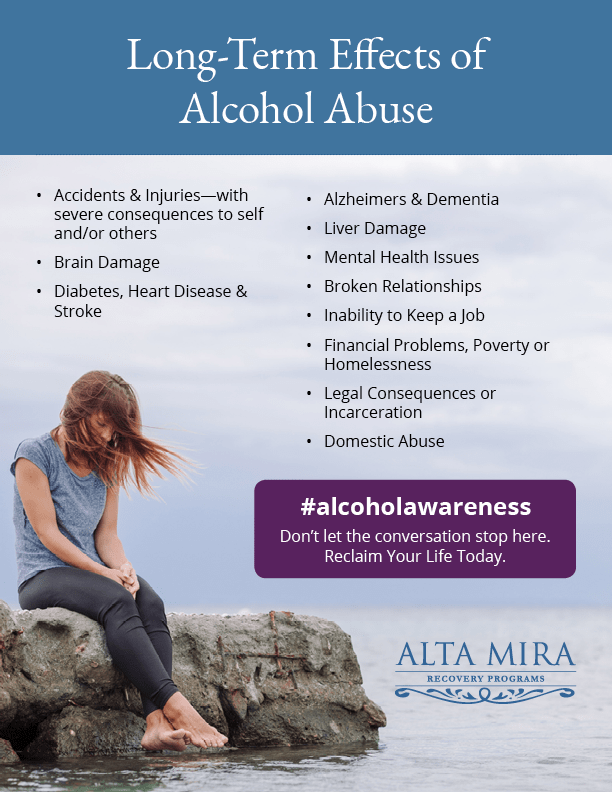
The Effects of Alcohol on the Body
The effects of alcohol on the body can be extensive, long-lasting, and even life-threatening. The extent of damage that alcohol does to the body depends on how heavily and for how long a person has been drinking, as well as other individual factors. Potentially alcohol can cause liver damage, heart disease, cancer, and pancreatitis, among many other conditions. Excessive drinking can even cause alcohol poisoning, which can be fatal. The negative effects of alcohol can be slowed, stopped, and even reversed if a person stops drinking.
Alcohol can be toxic for the body, and while moderate drinking is a low-risk activity, drinking too much at once, drinking heavily, and drinking too much regularly can have both immediate and lasting health effects.
The short-term intoxicating effects, such as loss of coordination and slurred speech, are caused by alcohol traveling through the bloodstream to the brain and interrupting the normal chemicals signaling that occurs there.
Over the long-term and with heavy drinking, alcohol can cause serious and lasting damage to the heart, the liver, the pancreas, and many other organs, even increasing the risk of several types of cancer.
Much of this damage can be stopped or even reversed by moderating or stopping drinking. Anyone who struggles to stop drinking may need assistance from addiction professionals, who can suggest treatment plans for alcoholism to work toward long-term sobriety.
How the Body Processes Alcohol
The substance in all alcoholic drinks that causes intoxication is ethanol. Ethanol is essentially a toxin that must be processed and metabolized in the body. Most of this occurs in the liver where enzymes break down ethanol into smaller components and finally into carbon dioxide and water that can be eliminated from the body. The pancreas, brain, and gastrointestinal tract also play a small role in the metabolism of alcohol.
An intermediary compound in this process is called acetaldehyde. It is short-lived and quickly processed into other substances, but it is harmful, carcinogenic, and causes damage for the short period it is present in the body during the processing of ethanol. This alone doesn’t explain all the negative effects that alcohol has on various parts of the body, but it is thought to play a role.
The body is only able to process a certain amount of ethanol at a time, which is why having more than approximately one drink per hour causes intoxication and other effects. Exactly how much a person can process in an hour depends on a number of factors, including genetics, gender, body mass, overall health, and the amount of food consumed around the same time. Women process alcohol more slowly because of a higher percentage of body fat, which does not absorb alcohol, and lower amounts of certain enzymes in the stomach.
Immediate Effects of Alcohol
The way alcohol affects a person in the short-term varies a little by individual, but in general it acts as a depressant, slowing breathing, reaction time, physical coordination, and the ability to think and concentrate. The number of drinks that produces certain effects and blood alcohol concentration (BAC) also varies by person. With just one or two drinks, BAC is likely to rise to 0.05. At this point, alcohol causes relaxation, lowered inhibitions, and decreased alertness and reaction times.
At a BAC between 0.05 and 0.10 fine motor skills are significantly impaired, as is reaction time and good judgement. A person may begin to exaggerate their movements and move clumsily. After five to seven drinks, and a BAC between 0.10 and 0.15, the effects include changes in perception and vision, mood swings, overly emotional reactions, and more extensive impairments in judgement and reaction time.
With a BAC between 0.15 and 0.30, which results from having between eight and 10 drinks, a person may begin to stagger, slur their speech, feel nauseated, vomit, have blurred vision, and be significantly impaired physically. Over 0.30, or more than 10 drinks, alcohol may cause a person to be unaware of their surroundings, or even unresponsive and unconscious.
How Alcohol Affects the Brain
Much of the immediate effects of alcohol are a result of what it does in the brain. Ethanol is absorbed into the bloodstream, and from there it moves throughout the body, even crossing the barrier into the brain. There it interferes with brain chemistry and communication signals. As a result it can cause mood swings, changes in behavior, poor coordination and loss of motor skills, poor judgement, and lowered inhibitions.
Research has found that certain areas of the brain are more greatly impacted by alcohol than others. These include the limbic system, which is related to emotion and memory, the cerebellum, responsible for motor control, and the cerebral cortex, which is involved in social interaction, intelligence, and the ability to plan and make decisions.
Alcohol consumed regularly, frequently, or heavily also has lasting effects on the brain. These include changes in neurons, reduced sizes of brain cells, a shrinking of the overall size of the brain, and impaired memory. Alcohol can also change neurotransmitters, chemical messengers, in the brain, causing tolerance, withdrawal, and addiction.
Effects of Alcohol on the Heart
Consuming an excessive amount of alcohol just once can cause damage to the heart. Drinking excessively or drinking regularly over a long period of time can cause extensive damage and resulting cardiovascular health problems, including an increased risk for heart attack or stroke.
Alcohol can lead to cardiomyopathy, which is stretching of the heart muscle, or an irregular heartbeat, called arrhythmia. Alcohol also triggers high blood pressure, which over time damages blood vessels.
Alcohol and the Liver
As the main organ for processing and metabolizing alcohol, the liver suffers much of the damage caused by excessive drinking. Long-term and heavy drinking causes liver disease, which occurs in three progressive stages:
- Alcoholic fatty liver. More than 90 percent of people who drink heavily will develop fatty liver disease. It causes inflammation in the liver, but there are typically no symptoms. The damage can be reversed by no longer consuming alcohol.
- Alcoholic hepatitis. The second stage of the disease is hepatitis, which is more serious inflammation of the liver and more severe damage. This may trigger symptoms like jaundice, fever, fatigue, abdominal tenderness, nausea and vomiting, and unintentional weight loss. Cessation of drinking can help reduce damage and reverse the progression of the disease at this point.
- Cirrhosis. The final stage of alcoholic liver disease is very serious. Cirrhosis occurs when the liver is so damaged that it develops scar tissue while trying to heal. This cannot be reversed, and ultimately it stops the liver from functioning normally. Cirrhosis can be fatal, but if caught early may be treatable. Stopping drinking can slow the damage but not reverse it.
Other Effects of Alcohol
The impact of alcohol on the body is far-reaching, although the most noticeable and severe effects are in the liver, brain, and heart. The pancreas plays a small role in alcohol metabolism, and it can be inflamed and damaged by drinking, leading to digestive issues and pancreatitis.
Heavy drinking can also hurt the body in ways unrelated to the processing organs. For instance, it can weaken the immune system, leading to lung and other infections. Alcohol also increases the risk of certain cancers, including mouth, esophageal, liver, breast, throat, colon, and stomach cancers.
Impact of Alcohol on Unborn Children
When a woman who is pregnant drinks any amount of alcohol, her child is affected. Exposing a fetus to alcohol can lead to a range of disabilities, from mild to severe, called fetal alcohol spectrum disorders. Some of the possible symptoms and disabilities a child may have because of the effects of alcohol on their developing body and brain include:
- Facial deformities
- Poor muscle tone
- Movement and balance issues
- Speech impairments
- Learning difficulties
- Poor development and physical growth
- Behavioral and social problems
- Cognitive problems and deficits
Drinking during pregnancy also increases the risk of a woman having a premature birth, of a baby being born with a low birth weight, and of miscarriages and stillbirths. Alcohol can also cause birth defects, including vision or hearing problems, or heart defects.
Alcohol Poisoning is Life Threatening
Excessive consumption can lead to a serious condition known as alcohol poisoning. It is exactly as the name suggests: drinking enough alcohol to cause severe, toxic effects. The amount of alcohol it takes to cause poisoning varies, but ultimately the cause is drinking too much too fast. About half of people whose BAC rises to 0.40 will die from alcohol poisoning.
Symptoms of alcohol poisoning include serious confusion, vomiting, extremely slow breathing or irregular breathing, seizures, skin that is pale or bluish, low body temperature, and loss of consciousness and unresponsiveness. It should be considered a medical emergency and is treated by giving fluids intravenously, providing oxygen, preventing choking, and with careful monitoring.
Alcohol causes a lot of damaging effects in the body, but there is hope for anyone who struggles with drinking. Treatment with therapy, medications, holistic medicine, group and family support, and other strategies can help anyone learn to moderate or stop drinking to reverse or slow the toll alcohol has taken on the body.







